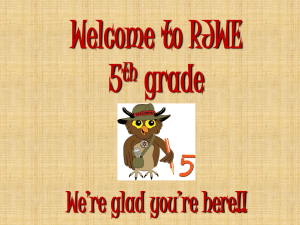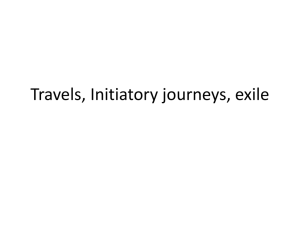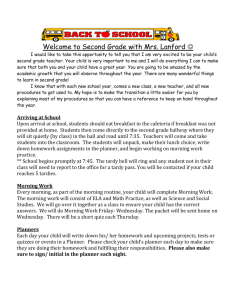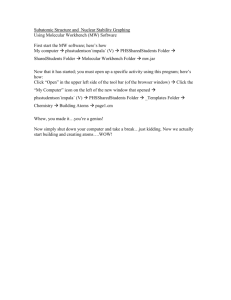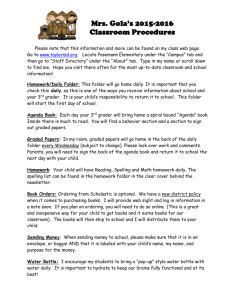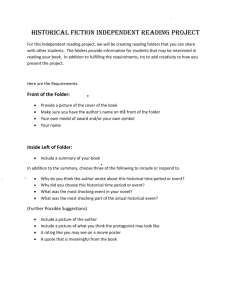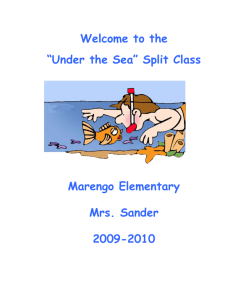3rd Grade Curriculum 3rd_grade_handbook-open_house
advertisement
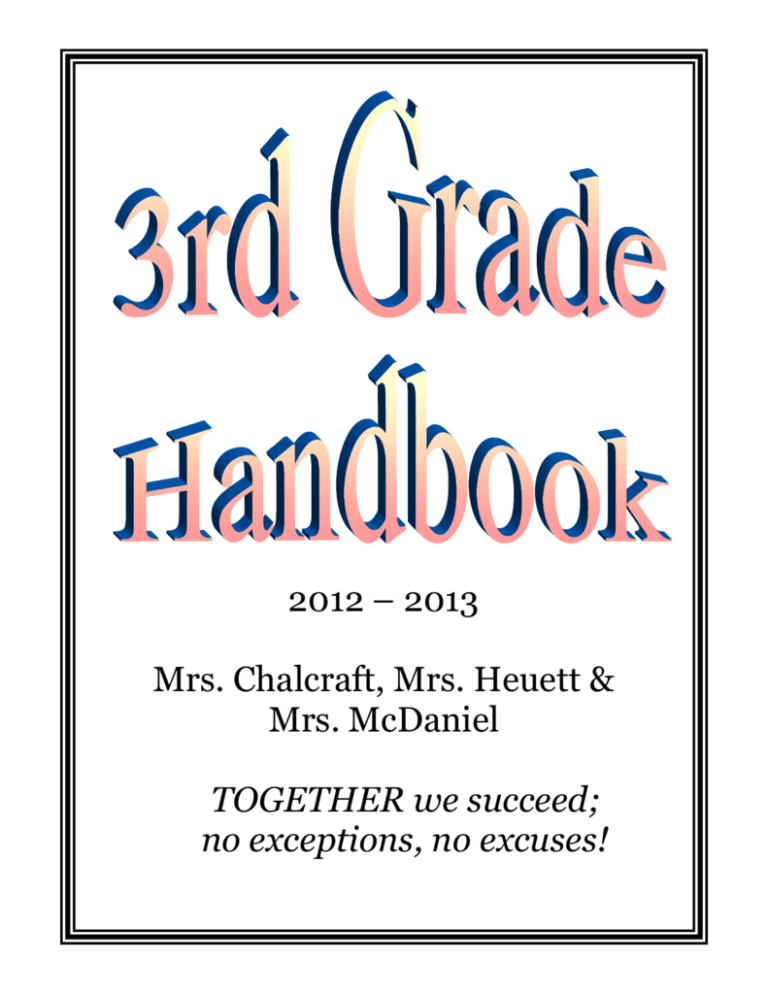
2012 – 2013 Mrs. Chalcraft, Mrs. Heuett & Mrs. McDaniel TOGETHER we succeed; no exceptions, no excuses! The following pages contain information that will help you and your child to have a better understanding of our classroom programs and expectations. If you have any questions, please feel free to contact us. By phone, the best times to reach us are before school, 8:25 – 9:00 and after school from 3:50 – 4:00. Email is another great resource for communication. michelle_chalcraft@sumnersd.org elli_mcdaniel@sumnersd.org nancy_heuett@sumnersd.org Study Skills, Organization, and Responsibility 3rd grade is a big transition year into intermediate. Your child will be expected to learn and use good study skills in third grade. This includes heading the papers correctly, organizing class bins and binders so that books and papers can easily be found, completing homework and assignments neatly and on time, following directions the first time they are given, returning the Friday Folder on time, etc. With guidance, third graders should begin to become very proficient in this area. Your support will enhance this growth throughout their educational career. Friday Folders Every Friday afternoon, your child will bring home their Navy Blue Friday folder. This folder is a very important source of communication for us between home and school. In the folder you will find a 3rd grade newsletter, news and papers from the school or community, work your child has done during the week, and a sign-off sheet stapled to the left side. Please take time over the weekend to read the newsletter and go through any papers that have come home. Only papers that need to be signed should be returned on Monday. The rest will be kept at home. On the left side, you will find a spot for teacher comments. If needed, we might make a comment to you. Sometimes it will be blank. That means there was nothing we needed to tell you. You will also see your child’s overall behavior and academic progress for the week. Finally, there is a spot for you to sign. Please sign and return the folder on Monday morning. Your child is going to need to be the messenger of the folder between school and home. This will take responsibility and organization! We know they can do it. Thanks for your support with this!!! Student Expectations: Attendance: Good attendance is necessary for students to succeed. When students miss even one day of school, it is impossible to make up that time lost. Most of our learning is done in the form of instruction, discussion, and active participation. Typically, we complete a work sample together prior to students’ independent practice. When students return to school after being absent, they will most likely need to stay in from recess to get the necessary instruction they have missed. Tardies: It is essential for students to arrive to school by 9:10 to ensure that they have enough time to turn in their Daily Success Folder, use the restroom, sharpen pencils, and begin “read to self” or their morning work by the time the tardy bell rings at 9:20. When students are late, they are not able to start their day in a calm and prepared manner. They also cause a disruption to our learning environment. Any student who enters the classroom after the tardy bell will be sent to the office to receive a tardy slip. Weekly Assignment Sheet (WAS)/Daily Success Folders: Students will be given time in class each afternoon to record the following on their WAS: Current book and start page for nightly reading, daily behavior (4, 3, 2, or 1), and homework assignment. Students are expected to do this neatly and completely every day. WAS will be placed in their Daily Success Folder, along with their book, and will be taken home each night. Please check your child’s WAS and homework and discuss your child’s day with him/her before signing. When students arrive in the morning, they’ll turn in their folder. I keep close track of reading progress. Students, who choose not to read or complete homework at home repeatedly, will need to do so during lunch recess. Homework: You can count on your child having homework every Monday-Thursday unless we specifically inform you otherwise in our Weekly Newsletter or the Weekly Assignment Sheet. The purpose of homework is to reinforce concepts and skills taught in class. It also helps us identify students who may need further practice and support in a small group. Finally, homework teaches responsibility and helps students develop positive study habits in preparation for the transition to 4th and 5th grade. Nightly homework: 1. A 10-15 minute assignment: This will be review of a concept or skill we’ve been working on in class. Because it’s review, it should never be a struggle. If it is, it’s important that I know. Therefore, it is your child’s responsibility to bring the assignment back to class and ask me for further assistance. Not only am I happy to help them, but they’ll feel a sense of pride for taking responsibility for their learning. 2. 30 minutes of reading (120 minutes weekly): Your child will record their book title and pages read on their Weekly Assignment Sheet. They will also write down their total minutes read, which must be initialed by a parent nightly. Students are required to read an A.R. chapter book in their reading zone/level during this time. It is important that your child selects a book and sticks with it. When they finish their book, they will take an A.R. quiz. 3. 5-10 minutes of math fact practice: You have a copy of our schedule for mastering addition and subtraction facts. Addition and subtraction fact mastery is very important as we’ll be heading into multiplication and division facts in the spring to prepare for 4th grade. For some students, quick recall of facts comes naturally and easily. For others, it is quite challenging. Please do whatever it takes to help your child master their facts/pass weekly timed tests. If your child is mastering our new facts tests, they do not need to practice these each night. If your child passes their addition and subtraction facts they will be challenged to begin mastery of multiplication and division. How can parents support and check homework? Please make homework a priority and provide a quiet place for your child to complete tasks. Written homework assignments are kept in the Daily Success Folder. These can be checked for both neatness and accuracy. You’re highly encouraged to listen to your child read and/or ask them questions about the book they’re reading. As we get into the school year, students also will know a variety of math fact games you can play as a family for fun! What if homework does not reflect “top quality” work or is incomplete? We will work to instill “top quality” from day one. Complete, quality work is expected. Students should be careful to follow the instructions of the teacher, as well as work samples completed together in class. Students will be required to redo assignments that do not reflect their very best effort during recess. 212 Degrees of Leadership In 3rd grade, we are working to become leaders! Leaders display 8 main characteristics: patience, kindness, humility, respect, selflessness, forgiveness, honesty, and commitment. Students are learning what these look like. They will learn that anyone can be a leader. These are not traits you are born with, they are learned habits. Our goal is that every 3rd grader learns to be a leader this year. As we head into 4th and 5th grade, our goal is to become a servant leader to our LRE community. Turn up the HEAT!!! As a way to track and communicate your child’s daily behavior progress, we’ll be using the thermometer. In addition to our Leadership, four expectations comprise the foundation of the thermometer and it is our school-wide expected behavior. SOAR: Safe Choices with Body and Words, Ownership of Actions, Achieve Excellence, and Respectful Behavior. At the beginning of each school week, every student will begin in “zone 3.” Behavior throughout the day will determine whether s/he moves up or down on the thermometer. Each evening, you will see a number (4,3,2,1) circled on your child’s Weekly Assignment Sheet indicating where s/he ended the day. Please check this score and discuss it with your child. Zone “4” is above 212 degrees. When your child’s Weekly Assignment Sheet is marked with a four, you’ll know s/he had a spectacular day of going above and beyond as a leader. Way to go!!! Zone “3” is the place to be, above 98.6 degrees! It’s on target. It signifies that your child is making safe choices, taking ownership of actions, achieving excellence and displaying respectful behavior in the classroom, hallways, at recess, on the bus, in the restroom, at assemblies, in the cafeteria, the gym and during dismissal. Whether they stay there, or for how long, are completely up to them. Excellent job being in zone 3! Zone “2” is below 98.6 degrees but above 32 degrees. From time to time, students may make poor choices and need to move their target down to zone 2. The most important thing to remember is that every mistake is a learning opportunity, and that the choices you make can be turned around immediately. Students have the chance at any moment of the day to earn their target back up the thermometer. Zone “1” is below 32 degrees…bbrrr..! If a student ends the day in zone 1, s/he will also have a “behavior notification” with more information about the day. Please sign that note and feel free to write comments or questions. You can always contact us via email or phone as well. The more we communicate the better we can serve your child. Curriculum We believe these four characteristics will enable students to create their own successes not only at school, but in the real world. Students have the freedom to make any choice they wish. Choices lead to rewards or consequences. We also believe the privileges are earned, not given. So, students who are on target or above will receive special privileges at various times throughout the week. (4-above and beyond, 3-on target, 2-warning/I made a poor choice, 1unacceptable/I’ve made several poor choices.) Students who move to a level “2” or “1” can earn their way back up the thermometer at any time during the week. You’ll know exactly how your child’s day went when you sign their Weekly Assignment Sheet each night. We thank you in advance for your support. Friday Club Requirements: Every week, students have the opportunity to earn an extra reward on Friday. This is known as Friday Club! This is earned by: complete class assignments, homework, & weekly reading (120min.) completely filling out Weekly Assignment Sheets and getting parent initials passing time tests (focus facts of the week) being caught up on 21 Book Club being a leader (zone 2 no more than two times during the week) Students who do not earn Friday Club will attend Study Hall. This is not a consequence, but an opportunity to get caught up on classwork. Other Incentives & Rewards: Verbal praise/positive note or phone call home Class dollars Friday student store Students can earn cash (class dollars) at any time during the day for making great choices, completing independent math pages, passing A.R. Quizzes, etc. They can also be “fined” for breaking school or classroom expectations. Students may spend their cash on items from the student store every Friday. Curriculum WRITING: In third grade we start out with notebook writing, teaching students that there are many ways to develop ideas for their writing. Students will practice gathering ideas and keeping them in a notebook that will guide their topics throughout the year. We will then get into the writing process as we begin with Personal Narratives. Students will engage in the steps that go into creating and developing a quality piece of writing. The traits they are scored on are IDEAS, ORGANIZATION, WORD CHOICE, VOICE, SENTENCE FLUENCY, and CONVENTIONS. They will work to become masters at elaboration. We begin the year with personal narrative and expository writing and then move into other types of writing in the spring. In 4th grade, students will take the MSP writing where they’ll be required to write one expository and one narrative piece. We will be working very hard to prepare the students for success on that assessment. MATH: We will have four areas that will be targeted in our math curriculum. Students will work on basic math computation in our Independent Math program. This gives your child the unique opportunity to work at his/her ability level and pace. Independent Math starts with addition, and then moves to subtraction, multiplication, division, fractions, decimals, and more. Not all students will reach the higher-level math, however there is always that opportunity. In the 3rd grade, students will need to show mastery of the addition and subtraction facts (30 problems in one minute at 90% accuracy). Although students will take a one minute timed test about three days a week, most students require more practice and will need to study at home often. Students who do not master their facts will struggle to be successful in all other areas of math. Another area of math is the state PEs (Performance Expectations). Students will work on problem solving, basic skills, and conceptual learning. Some of the areas we’ll focus on are addition and subtraction, multiplication and division, graphing, patterns, strategies for memorizing facts, logical thinking, fractions, geometry, measurement, and probability. The majority of our math time is spent working to master these concepts that students will be tested on in May when they take the math MSP. READING: Reader’s Workshop consists of whole group instruction, silent and independent reading, shared partner reading, written response to a reading power standard, and participating in a Walk to Read guided reading group that is tailored to each student’s individual needs. This program is a critical component of each student’s growth. Our reading curriculum is called Storytown by Harcourt School Publishers. Each week or two will bring about a new and exciting story, which correlates with one of six themes. Students will learn and practice a variety of specific skills during reading time, such as reading fluency, robust vocabulary, grammar, and comprehension skills which tie in with our District’s reading power standards. Students will be expected to show mastery of skills such as summarizing, finding theme and main idea, author’s purpose, inferring, drawing conclusions, compare/contrast, character traits, and cause and effect. They will be assessed on these areas through MSP released items. Look for them to come home in the Friday folder every so often. Walk to Read: Every student will be receiving 40 minutes of reading instruction in a small group four days per week. These groups are tailored to students’ reading level and greatest area of need: comprehension, accuracy, fluency, written responses, or an enrichment group which challenges higher level readers in all areas. Independent Reading/21 Book Club: Students are required to read an A.R. chapter book in their assigned “zone” (level) at school and at home. Students should finish a book every 2-3 weeks in order to meet our goal of completing 7 books each trimester. For each book students read, they must complete a written response which correlates with our current Power Standard, and pass an A.R. Quiz with a score of 80-100%. In third grade, reading is a top priority at school and at home. Ultimately, we want students to utilize reading as a tool for gaining new knowledge and, perhaps more importantly, simply for personal enjoyment. The at-home reading requirement is explained in the homework section of this packet. Again, reading beyond the minimum requirement is always highly encouraged, as it will only help your child progress and reach his/her reading potential! Reading is everywhere! SPELLING: In addition to grade level high frequency words, in 3rd grade, students will each have a list of their own personal spelling words. Just like reading, writing and math, students have different needs when it comes to spelling. Your child’s spelling list will be taken from the writing they do. We watch to see which high-frequency words each student needs practice with spelling. You can help your child at home by making sure they are spelling the high-frequency words correctly. You can find a copy of these inside your child’s green success folder. Please use it, but keep it in the success folder readily available. SCIENCE In third grade we focus on Water and Weather, Changes in Ecosystems, and Variation of Inherited Characteristics Liberty Ridge Science Fair: In 3rd grade, we will be creating a classroom science fair project. Students who wish to complete an independent project at home are supported to do so, but it is not required until 4th grade. We will learn to follow the scientific investigation process of generating a question, developing a hypothesis, planning, and conducting an experiment. SOCIAL STUDIES Our Social Studies scope and sequence entails the study of Native Americans of the Northwest. The state mandated Classroom Based Assessment (CBA) will show what we have learned in class about Native Americans. The topic will be Humans and the Environment. This paper is a large portion of the student’s third trimester Social Studies report card grade. Grades The Sumner School District uses a four point grade scale (explained below). Please note that if a student receives a three that does not mean that anything is wrong with the work. It means s/he has met the expectation. A four is saved for exceptional work. When a student shows a high level of thinking, they receive 4s. 4 – Work is above and beyond expectation! WOW! 3 – Student has met the expectation. 2 – Expectation was mostly met; however something was not totally correct or complete. Student is working towards the expectation. 1 – Work is below expectation and needs improvement. If a student ever has a question about a paper’s grade, I encourage him/her to talk to me so I may explain it. Understanding our errors is an important step in the learning process. Guest Teachers Students are expected to be on their BEST behavior when we are gone. We understand it may be difficult having someone new in the room that doesn’t know our daily procedures, but with patience, cooperation, and flexibility, we’ll all do just fine. If students choose to act inappropriately, they will be asked to write an apology letter to the guest teacher, take a copy of the letter home to be signed, and will lose recess for a minimum of two days. Leaders always show respect to anyone they are around. No exceptions; no e excuses! Let’s make it a great year!
